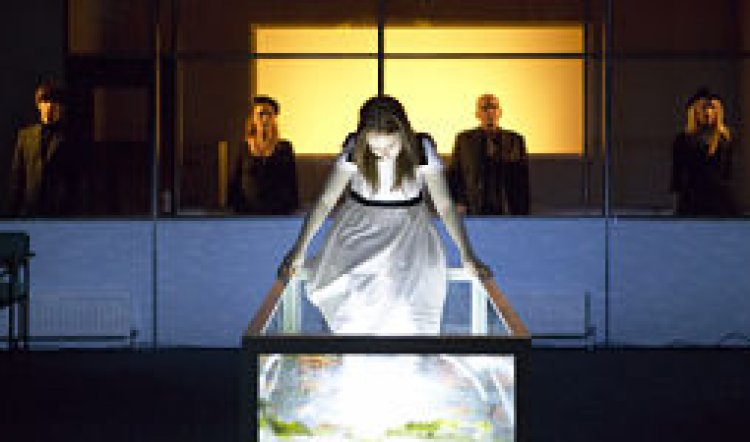
SYDNEY FESTIVAL – SIX CHARACTERS IN SEARCH OF AN AUTHOR
Six Characters in Search of an Author Everest Theatre, Seymour Centre, January 9-31, 2010.
GERTRUDE STEIN, on her death bed, asked Alice B Toklas, “What is the answer?” Toklas was unable to respond and Stein then said, “In that case, what is the question?” In essence, it’s what Pirandello was asking in 1921 with this most modernist of plays (subtitled “a comedy in the making”); and what his adaptive-collaborators Rupert Goold and Ben Power continue to grapple with in the 21st century.
Their company Headlong scored a critical and popular triumph with the production, which began at the Chichester Festival Theatre and transferred to the West End and now to the Sydney Festival, where it is one of the intellectual and dramatic centrepieces, despite the players’ facetious reference to “the Ostermeier Hamlet” scooping all available funding and preventing them going to festivals.
An earnest documentary filmmaker (Catherine McCormack) is trying to pull together a TV doco about euthanasia, her producer (Jamie Bower) just isn’t into it; it is worthy but unsexy– not that he would say so out loud – and he would rather be making a full length feature for the BBC anyway; which is said at some point. Six black-clad people arrive unannounced in the bare and decrepit studio/office. They look like extras from The Garden of the Finzi Continis: a father (Ian McDiarmid), a mother (Eleanor David), a young daughter (Freya Parker), an older step-daughter (Denise Gough) and a little boy (either Cole Burgess or Cole Lewis). They are not real, they’re characters and they’ve been abandoned by their author, they want to find another to tell their story. The characters within the documentary are not real either, but in the way of characters (as Father points out) they are more real than the “real” people because they are immutable. Meanwhile, the acting, across the company which also includes Sarah Belcher, Jake Harders, Jeremy Joyce, Martin Ledwith and Robin Pearce, is uniformly splendid: it’s impossible to see the joins between reality and pretend.
Pirandello was working at a time when the old certainties that had guided and ruled European society were in flux or destroyed. The Great War (WW1) had caused death and destruction on an unprecedented scale and also created havoc with the social structures. While millions still attempted to cling to God and certainty, both had been irretrievably displaced from the centre and artists were grappling with what was perceived as the end of truth, God and conviction. So Pirandello devised a satirical comedy about truth and reality – neither of which seemed particularly possible or relevant in 1920s Europe.
Into the second decade of the 21st century the ground is shifting constantly and as never before. The new war, symbolised by 9/11 and now global, is bizarrely invisible for most, but more far-reaching than either of the previous “world” wars. How then to deal with that reality and today’s perceptions of truth? The camera is now omnipresent in our lives. It was supposed to “never lie” but we all know it does little else, and in this production it is the thread that stitches together what it also blows apart. Within the Goold-Power play, a documentary is seen to be at once a construction and nonsensical; a life and its meaning is both fictitious and real: depending who is enacting it. And when the difference between drama-documentary and docu-drama is also the difference between life and death, the laughter quickly becomes self conscious, and we become conscious of self, as perhaps never before.
-c750x442.jpg)
If that sounds tricksy and tiresome, well perhaps, occasionally and sometimes. But the ideas, spectacle and drama of the layer upon layer; and then another layer upon that layer and maybe another over or under that, make for a compelling and absorbing two and a bit hours. I think Pirandello – and this company – are saying that we make ourselves up as we go along; that we are what we are at this moment, but not yesterday or next week. That we fear change and the complexities of life more than we like to admit; but it’s all ridiculous and really quite funny anyway. Or maybe not: that’s up to you.
Nevertheless, it’s a wonderful, daring, deeply humorous, challenging and humane work. If you don’t come out wondering about your assumptions, beliefs and certainties; your relationship to the world, to theatre and to yourself, then you were perhaps asleep, or too afraid to listen. Or the whole thing was fiction and yesterday anyway, so it’s something quite different today – as are you; and me.
WB Yeats wrote The Second Coming, in 1919 and it was published in 1920; it could be read as a comment not only on the times, but on this play and this production:
TURNING and turning in the widening gyre/ The falcon cannot hear the falconer;/ Things fall apart; the centre cannot hold;/ Mere anarchy is loosed upon the world,/ The blood-dimmed tide is loosed, and everywhere/ The ceremony of innocence is drowned;/ The best lack all conviction, while the worst/ Are full of passionate intensity./ Surely some revelation is at hand;/ Surely the Second Coming is at hand./ The Second Coming! Hardly are those words out/ When a vast image out of Spiritus Mundi/ Troubles my sight: somewhere in sands of the desert/ A shape with lion body and the head of a man,/ A gaze blank and pitiless as the sun,/ Is moving its slow thighs, while all about it/ Reel shadows of the indignant desert birds./ The darkness drops again; but now I know/ That twenty centuries of stony sleep/ Were vexed to nightmare by a rocking cradle,/ And what rough beast, its hour come round at last,/ Slouches towards Bethlehem to be born?



